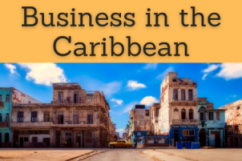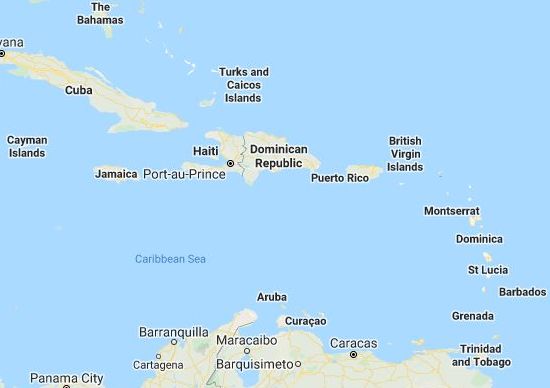Business in Antigua and Barbuda. Antiguan Economy
Antiguan Foreign Trade, Logistics, Business in St. John's (Antigua and Barbuda)

Antigua and Barbuda is a tax haven since 2000
- Antigua and Barbuda is considered as an offshore jurisdiction
- Has signed the UN law against money laundering
- Antigua and Barbuda is considered a paradise for drug trafficking and money laundering
Main industries: oil refining, textile manufacturing, joinery and rum production
88% of the population has an African origin (African Diaspora)
- Introduction to Antigua and Barbuda
- Doing Business in St. John's
- Antiguan Economy
- Antiguan Foreign Trade
- Transport and Logistics
- Business Opportunities in Antigua and Barbuda
- Access to the Antiguan market
- Business Plan for Antigua and Barbuda

The educational aims of the Subject «Doing Business, Trade and Transport in Antigua and Barbuda» are:
- To analyze the Antiguan Economy, Logistics and Global Trade
- To conduct research on business opportunities in Antigua and Barbuda
- To research the trade relations of Antigua and Barbuda with the student's country
- To know Trade Agreements of Antigua and Barbuda
- To develop a business plan for the Antiguan market

The Subject «Foreign Trade, Logistics and Business in Antigua and Barbuda» is included within the curriculum of the following academic programs at EENI Global Business School:
Masters: International Business, Foreign Trade.


Masters adapted for Caribbean students.
Languages  (
( Antigua and Barbuda
Antigua and Barbuda
 Antigua et Barbuda
Antigua et Barbuda  Antigua e Barbuda).
Antigua e Barbuda).
International Trade, Logistics and Business in Antigua and Barbuda

Preferential Access and Trade Agreements of Antigua and Barbuda
- Antigua and Barbuda and the Caribbean Economic Area
- Association of Caribbean States
- Bolivarian Alliance for the Peoples of Our America (ALBA)
- CARICOM
- CARIFORUM-EU Agreement
- Colombia-CARICOM Agreement (Antigua and Barbuda)
- CARICOM-Dominican Republic Agreement
- Costa Rica-CARICOM Agreement (Antigua and Barbuda)
- Caribbean-Canada Trade Agreement
- The United States-Caribbean Basin Trade Partnership Act
- UK-CARIFORUM Free Trade and Economic Integration Agreement
- Caribbean Basin Initiative
- Organization of Eastern Caribbean States (OECS)

- World Trade Organization (WTO)
- Agreement on Trade in Services (GATS)
- Agreement on the Application of Sanitary Measures
- Agreement on Technical Barriers to Trade
- Agreement on Preshipment Inspection
- Agreement on Safeguards
- Trade Facilitation Agreement
- BIC
- Chicago Convention (ICAO)
- International Maritime Organization (IMO)
- Is not a member of WCO
- Kyoto Convention

- CELAC
- Organization of American States (OAS)
- Economic Commission for Latin America (ECLAC)

- Commonwealth
- United Nations
- World Bank
- World Trade Organization (WTO)
- International Monetary Fund
- Antiguan Capital: St. John's (Island of Antigua)
- Largest cities: St. John's, All Saints, Potters Village and Liberta
- Antigua and Barbuda does not share land borders with any country
- Nearest countries to Antigua and Barbuda by sea: Guadalupe, Montserrat, Saint Kitts and Nevis and Saint Martin
- Area of Antigua and Barbuda: 442 km²
- Population of Antigua and Barbuda: 92,000 inhabitants
- Density of the Antiguan population: 209 inhabitants / km²
- Official language of Antigua and Barbuda: English
- Creole English
- Spanish is increasingly used
- Abolition of Slavery in Antigua and Barbuda: 1834
- Climate of Antigua and Barbuda: tropical
- 1667: British colonization
- Type of government: Constitutional monarchy (Queen Elizabeth II, Commonwealth)
Main religion in Antigua and Barbuda:
- Christianity - Protestantism: 69% of the Antiguan population
Antigua and Barbuda belongs to the Caribbean Economic Area.

Antiguan Economy.
- Antiguan GDP: 2,159 million dollars
- GDP per capita of Antigua and Barbuda: 23,922 Dollars
- In September 2017, the Hurricane Irma destroyed 95% of Barbuda's buildings and infrastructure
- Main Antiguan economic activity is the sugar industry
- Tourism: 60 % of GDP of Antigua and Barbuda
- Significant agricultural production: sugar cane, cotton and fruits (papaya, guava, orange, pineapple, lemons)
- Antiguan Currency: Eastern Caribbean Dollar (XCD)
- Fixed exchange rate with the United States dollar (2,7:1)
- Country code top-level domain of Antigua and Barbuda:.ag

Antiguan Foreign Trade
- Main Exports of Antigua and Barbuda: petroleum products, machinery, transport equipment and food
- Main export markets of Antigua and Barbuda: the countries of the Organization of Eastern Caribbean States, Barbados, Guyana, Trinidad and Tobago, the United States, Spain, Germany, Italy, Singapore, the UK
- Main imports of Antigua and Barbuda: agricultural and petroleum products
- Largest providers of Antigua and Barbuda: the United States, the UK, Canada and the countries of the Organization of Eastern Caribbean States

International Transport and Logistics in Antigua and Barbuda:
- Main seaport: St. John's
- 1,165 Kilometers of roads (384 km paved)
- Driving on the left
- 80 Kilometers of railway lines
- Antigua Airport
(c) EENI Global Business School (1995-2025)
Top of this page








 WhatsApp
WhatsApp